
Potent warnings, horrible quitting advice: what's the CDC smoking?
The Centers for Disease Control's new "Tips from Former Smokers" campaign will make the pharmaceutical industry millions. But how many lives will it cost?
 Featuring scarred, diseased and disabled former smokers, Monday, March 19, marks the launch of a new 12-week, hard-hitting $54 million advertising campaign by the Centers for Disease Control (CDC), during which it hopes to motivate 50,000 smokers to quit.1
Featuring scarred, diseased and disabled former smokers, Monday, March 19, marks the launch of a new 12-week, hard-hitting $54 million advertising campaign by the Centers for Disease Control (CDC), during which it hopes to motivate 50,000 smokers to quit.1
While likely to succeed in herding thousands of fear driven smokers to its website and toll free phone line, CDC continuing insistence upon replacement nicotine as the cornerstone of national cessation policy dooms 9 of 10 (86-93 percent) to smoking relapse within 9 months of quitting.2
Actually, it could be worse. While fear can and does motivate intention to quit, it has little sustaining power as an ongoing cessation motivator. Like ignored cigarette pack health warnings, smokers quickly grow numb to it.
Sadly, the CDC and National Cancer Institute (NCI) continue to behave as though they are employees of GlaxoSmithKline, Pfizer and Johnson & Johnson, the primary benefactors of both this campaign and the quitting product era. It's an era that the CDC openly admits has ground the decline in adult smoking to a standstill.
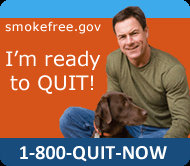 The CDC's new "Tips from Former Smokers" campaign webpage refers smokers to either SmokeFree.gov or 1-800-QUIT-NOW, both of which strongly urge use of approved quitting products.
The CDC's new "Tips from Former Smokers" campaign webpage refers smokers to either SmokeFree.gov or 1-800-QUIT-NOW, both of which strongly urge use of approved quitting products.
The national 1-800-QUIT-NOW quitline number routes callers to the quitline service provider who has contracted with each state. Consistent with CDC quitting policy, the primary counseling script objective is to get callers to use the nicotine patch, gum, lozenge, spray, inhaler, Zyban or Chantix.
During 2009, 109,055 U.S. quitline callers received an average of $200 worth of "free" "medicine," primarily nicotine patches (9.5mb PowerPoint). But are patches really free when nearly all of the $22.5 million spent purchasing free quitting products was paid by taxpayers?
If the success rate among those 109,055 quitline medication users matched the government determined quitline success rate of 15.5% at 6 months (see Table 1.3 PDF page 28), it means that 92,903 failed and relapsed to smoking.
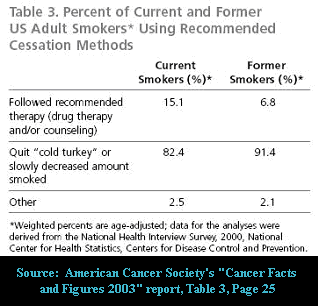 The two largest 1-800-QUIT-NOW quitline counseling service providers are Free & Clear and the American Cancer Society.
The two largest 1-800-QUIT-NOW quitline counseling service providers are Free & Clear and the American Cancer Society.
During 2010, Free & Clear was runner-up for the "Tobacco Control Lie of the Year Award" after being caught creatively inflating program success rates and using them in marketing.
The American Cancer Society has a history of having betrayed free cold turkey quitting in exchange for millions in contributions from those selling quitting products.
Originally partnering with GlaxoSmithKline (Nicorette gum, Nicoderm patch and Zyban), today the Cancer Society is more financially dependent upon Pfizer (Chantix, Nicotrol inhaler and Nicotrol nasal spray).
The SmokeFree.gov website is a CDC and NCI operated pharm industry storefront which could be renamed BuyMeds.now. There, the CDC's fear riddled harvest of smokers will be bombarded with 173 suggestions to buy and use "medication" or "medicine."
Both the CDC and NCI are fully aware that while FDA approved quitting products clobber placebo quitters inside randomized clinical trials, that once outside clinical trial doors they get clobbered just as badly by real-world cold turkey quitters.3
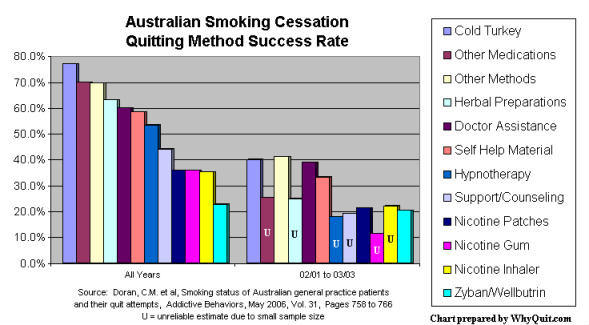
"Population-based data show that cold turkey quitting remains the most effective strategy," blogged Professor Michael Siegel of the Boston University School of Public Health on March 14.
Whether competing against real-world cold turkey quitters, unassisted quitters, non-NRT or non-medication quitters, approved quitting products have failed to prevail in nearly every population level study since June 2000.4
That was when frustrated public health service bureaucrats entrusted pharmaceutical industry financial influence with authorship of official U.S. cessation policy.5
Motivated by the July 4, 1997 arrival of Zyban and its absence from the 1996 Guideline, as suggested by an October 15, 1997 signed profit epiphany securing 1998 Guideline revision leadership, since June 27, 2000 U.S. quitting policy has declared that unless contraindicated, approved quitting products should be used by "all" smokers attempting to quit.6
A stroke of corporate genius, thousands of federal and state health care workers were instantly and permanently transformed into pharmaceutical industry quitting product salesmen.
That lone recommendation not only consumed all others, it effectively destroyed the credibility and backing of all other quitting methods and programs, including the neighborhood non-medication support-oriented stop smoking group.
For example, WhyQuit is by far the Internet's most popular cold turkey forum, serving 4.6 times as many unique visitors during 2009 than all U.S. quitlines combined (1,588,068 versus 343,996). While state and local health officials have from time to time attempted sharing WhyQuit's link, federal health officials soon intercede, reminding them of the obvious, that WhyQuit's lessons are contrary to official policy.
The CDC is fully aware that each year more smokers quit smoking cold turkey than by all other methods combined.
"We have long known that if you survey ex-smokers and ask them what strategy they used on their final, successful quit attempt, around two-thirds to three quarters answer 'cold turkey'," blogged University of Sydney public health Professor Simon Chapman on February 22. "This was the case in the early days of NRT, and it remains so today."
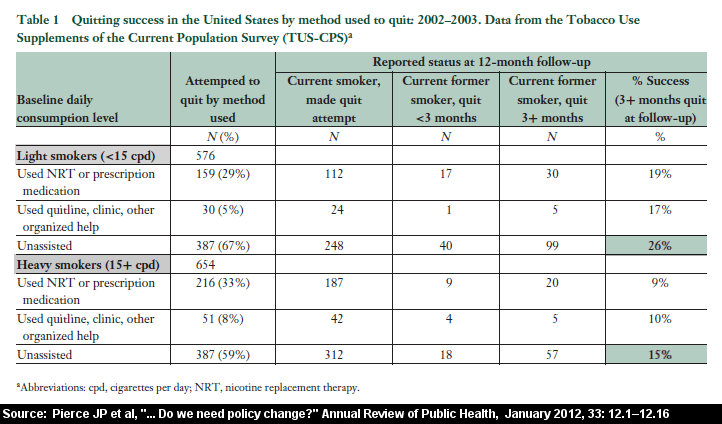
The CDC knows that the only government population level quitting method study since 2000 found non-medication quitting superior to medication. It also realizes that the study's "non-medication" group included a number of quitting methods inferior to cold turkey.
That study was conducted in 2006 by Ann Hartman with the National Cancer Institute.7 Try to locate a copy of the Hartman study, or any reference to it, on any government website.
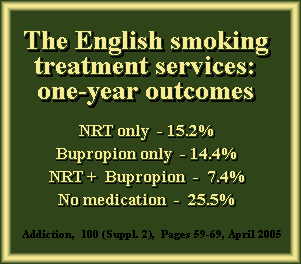 Sadly, government health officials are at the center of the most profound and deadly health cover-up in America's history.
Sadly, government health officials are at the center of the most profound and deadly health cover-up in America's history.
Try to locate any government website that is honest with smokers about the fact that the super majority of long-term ex-smokers quit smoking cold turkey. Even worse, try to locate any government website that doesn't discourage cold turkey quitting.
The CDC and NCI know that placebo isn't a real quitting method and that placebo-controlled cessation trials have not been blind as claimed and once believed. It knows that a growing body of population level evidence totally contradicts thousands of government "double your chances" quitting product assurances.
Since June 2000, our mandatory medication use policy has effectively forbid government health officials from offering encouragement or support to cold turkey quitters. But it's worse. Imagine government health officials not only turning their backs on the majority of quitters, but actively discouraging them while in the process of fighting to save their lives.
Imagine being a cold turkey quitter, going to the SmokeFree.gov website and downloading a copy of the government's most popular quitting booklet, the NCI's "Clearing the Air." Imagine the pride felt upon reaching page 10 and the heading labeled "Cold Turkey."
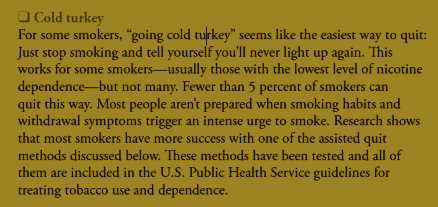 Now, imagine your horror upon reading the outright falsehood that, "Fewer than five percent of smokers can quit this way."
Now, imagine your horror upon reading the outright falsehood that, "Fewer than five percent of smokers can quit this way."
Imagine the instant motivation drain when hit by the next lie, that "Research shows that most smokers have more success with one of the assisted quit methods discussed below," where the first listed method is "Over-the-counter medications."
What possible justification could the CDC and NCI have for continuing to lie to smokers about how most quitters succeed?
How many "Tips from Former Smokers" campaign victims would have successfully quit and avoided disease if government health officials had not devoted the past three decades to trashing and bashing confidence in their natural quitting instincts? Does any CDC or NCI employee care?
"The findings of this study cast doubt on the relative effectiveness of NRT as a population strategy," wrote the authors of the 2012 Alpert study.8 "To date, there is no evidence that such policies lead to an increase in successful cessation in the population," wrote the authors of the 2012 Pierce study.9
Slave to smothering years of pharm-trusting incompetence, cowardice in suspending an insane and killer cessation policy, on March 19 the CDC will take a stab at using fear to accomplish what it knows the products being fed to that fear cannot.
References:
1 Centers for Disease Control, CDC Launches Tobacco Education Campaign, March 15, 2012 http://www.cdc.gov/Features/TobaccoEducationCampaign/
2 Hartman AM. What does US national population survey data reveal about effectiveness of nicotine replacement therapy on smoking cessation? National Cancer Institute paper presented at World Conference on Tobacco or Health, 12-15 July 2006, Washington, DC. FREE Full Text (see charts on PDF pages 35-37); and Hughes JR, Shiffman S, Callas P and Zhang J. A meta-analysis of the efficacy of over-the-counter nicotine replacement, Tobacco Control 2003; Volume 12, Pages 21-27. FREE Full Text
3 Doran CM, Valenti L, Robinson M, Britt H, Mattick RP. Smoking status of Australian general practice patients and their attempts to quit. Addictive Behaviors, May 2006, Volume 31(5), Pages 758-765. Abstract
4 Alberg AJ, Patnaik JL, May JW, Hoffman SC, Gitchelle J, Comstock GW and Helzlsouer KJ, Nicotine replacement therapy use among a cohort of smokers, Journal of Addictive Diseases 2005, Volume 24(1), Pages 101-113. Abstract; Pierce JP, Cummins SE, White MM, Humphrey A, Messer K, Quitlines and Nicotine Replacement for Smoking Cessation: Do We Need to Change Policy?, Annu. Rev. Public Health 2012. 33:12.1–12.16. Abstract; Ferguson J, Bauld L, Chesterman J, Judge K, The English smoking treatment services: one-year outcomes, Addiction. 2005 Apr;100 Suppl 2:59-69. Abstract; Pierce JP, Gilpin EA, Impact of over-the-counter sales on effectiveness of pharmaceutical aids for smoking cessation, JAMA. 2002 Sept. 11;288(10):1260-4. FREE Full Text
5 Polito JR, U.S. quit smoking policy integrity drowns in pharmaceutical influence, May 13, 2008, WhyQuit, https://whyquit.com/pr/051308.html
6 Fiore MC, Jaen CR, Baker TB, et al. Treating Tobacco Use and Dependence: 2008 Update. Clinical Practice Guideline. Rockville (MD): U.S. Department of Health and Human Services, Public Health Service, 2008. FREE Full Text
7 Hartman AM. What does US national population survey data reveal about effectiveness of nicotine replacement therapy on smoking cessation? National Cancer Institute paper presented at World Conference on Tobacco or Health, 12-15 July 2006, Washington, DC. FREE Full Text (see charts on PDF pages 35-37)
8 Alpert, HR, Connolly GN, Biener, L, A prospective cohort study challenging the effectiveness of population-based medical intervention for smoking cessation, TC Online First, January 10, 2012. Abstract;
9 Pierce JP, Cummins SE, White MM, Humphrey A, Messer K, Quitlines and Nicotine Replacement for Smoking Cessation: Do We Need to Change Policy?, Annu. Rev. Public Health 2012. 33:12.1–12.16.

